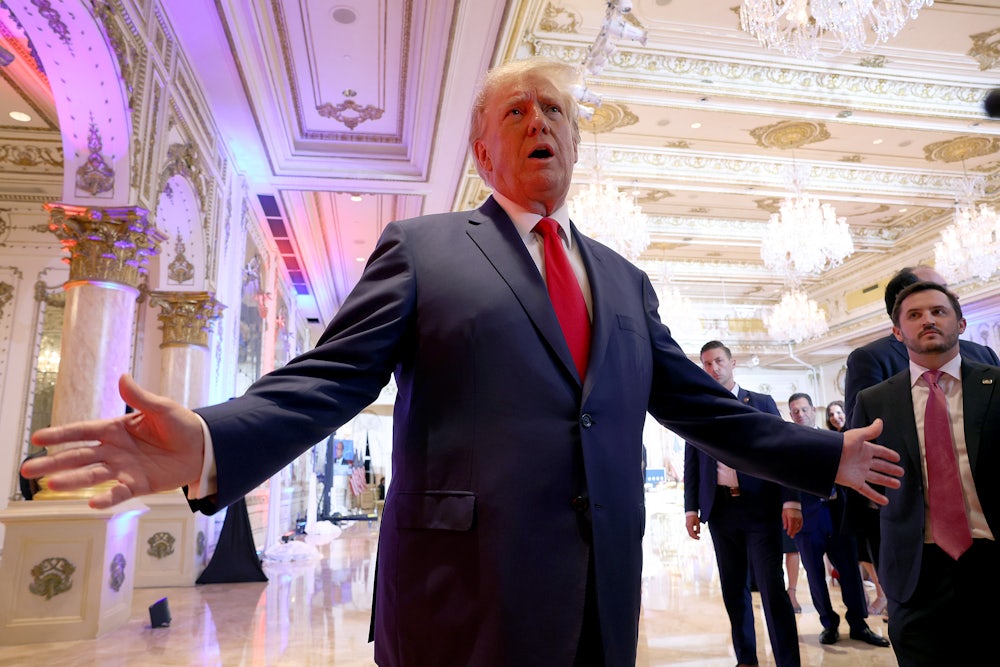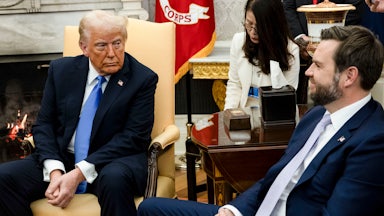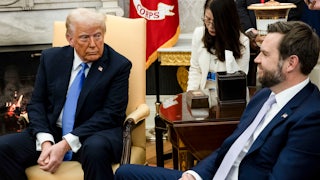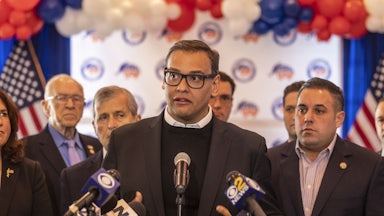Welp. All signs indicate that Donald Trump is, indeed, going to announce his presidential candidacy Tuesday night from Mar-a-Lago. Fox News, which despite Rupert Murdoch’s recent distancing from Trump ought to know these things, reports that two sources in Trumpworld are certain he’ll run. And Jason Miller, longtime Trump apparatchik, told Steve Bannon (isn’t he supposed to be in jail?) Friday: “President Trump is going to announce on Tuesday that he’s running for president. And it’s going to be a very professional, very buttoned-up announcement.”
You can count me among the surprised, but not for the reason you think. The reason you think is probably that many Republicans are furious at him after the GOP’s calamitous midterm showing, and want him to wait—at a minimum until after the December 6 Georgia Senate runoff and, at a maximum, forever. But the real reason I’m surprised is that Ronna McDaniel, that relentless Trump flatterer and lickspittle, announced last week that once Trump declares his candidacy, the Republican National Committee has to stop paying his legal bills. He’s such a cheapskate, and those legal bills stand such a very good chance of getting a lot bigger sooner, that I’d have thought he’d delay it for that reason alone. But I suppose he’ll just invent a new grift to lay on his gullible fans. (As Politico’s Sam Stein reported, some of these got fleeced by a fresh fundraising email to kick off the weekend.)
Some Republicans are starting to mutter aloud that they’re over Trump and it’s time to move on. His midterm kingmaking record was a disaster, and if not for his meddling … well, what? Their theory is that the party would have been fine. Right. Republicans, I have news for you: You cannot blame this train wreck of an election on Trump. There’s plenty more blame to go around, and if you think the only problem you have with the American people is Donald Trump, you are being delusional. The differences between the Trump you’re rejecting and the Trumpism to which you’re clinging are barely discernible.
But let’s start with the blame Trump does deserve. There’s some, but not as much as you’d think, listening to some Republicans fulminate on background. He might have cost his party two Senate seats. In Pennsylvania, it seems pretty clear to me that Dave McCormick would have been a stronger general election candidate than Mehmet Oz, and in Arizona, there were two candidates who probably would have been stronger against Democrat Mark Kelly than Blake Masters. Trump’s early June endorsement of Masters boosted him in the polls, so his primary win can be blamed squarely on Trump. It’s pretty much the same with Oz, whom Trump endorsed in April. Polls before Trump’s endorsement showed the primary to be close but with McCormick ahead more often than not.
In governors’ races, there was another GOP contender in Arizona who arguably would have been more credible in a general than Kari Lake. That was a close, hard-fought primary where Trump’s endorsement of Lake probably made the difference. But it’s hard to make the case that the alternative candidate, Karrin Taylor Robson, would have done better against Katie Hobbs than Lake has. A late July poll had Hobbs leading Lake by nine and Robson by eight. (Note: Hobbs’s lead over Lake grew over the weekend to 34,000 votes with about 265,000 left to count.)
But outside of that race, it’s hard to say that Trump personally launched any extremists into general election battles who wouldn’t have gotten there anyway. Pennsylvania’s Doug Mastriano crushed his opponents, for example, and would have likely won the primary without Trump. He was leading in the polls before Trump’s late preprimary endorsement.
Now, obviously, those two Senate seats are a huge deal. And then there’s Herschel Walker, but Walker was miles ahead of his primary foes long before Trump endorsed him in September. So it’s really just Oz and Masters.
Trump’s House endorsees almost all won. There were a couple high-profile losses, but it’s hard to say those were Trump’s fault. Sarah Palin, for example, lost because of Sarah Palin, not Donald Trump. Most of Trump’s endorsees were in safe districts. In fact—here’s something I doubt you’ve read in the last few days—according to Ballotpedia, the success rate of Trump’s endorsees in 2022 is the highest in any of the last five years, at 80 percent.
The House disaster for Republicans certainly can’t be blamed on Trump. Then whose fault was it? Well, how about we start with Samuel Alito and the Supreme Court? Alito’s in-your-face opinion spiking Roe, combined with Clarence Thomas’s concurring declaration of war on much of modernity, obviously spurred a huge backlash. The court could have taken John Roberts’s middle path on Dobbs, simply upholding the Mississippi law without completely defenestrating Roe, and the effect would have been similar but the political backlash minimal. But the five right-wing justices are maximalists, and they cost the Republicans far more votes than Trump did.
How about Kevin McCarthy and Tom Emmer, the GOP House member who oversaw their campaign effort this cycle? Did they really need to recruit and back all those extremist election deniers? This is partially Trump’s fault, because without him, the Big Lie that underpins the GOP’s widespread election denialism might not exist. But it’s not like the Republican Party put up a lot of resistance. Remember, roughly two-thirds of the House GOP caucus voted not to certify Joe Biden as president. Was that Donald Trump’s fault? Were they suddenly robbed of their free will?
And to the extent that voters out there—in, say, the 7th congressional district of Virginia, where Democrat Abigail Spanberger won reelection against an extremist, or Michigan’s 3rd, where Hillary Scholten did the same—judged the Republican candidates to be outside the mainstream and unserious about governing, was that Trump’s fault? Again, sort of. But the GOP’s death march to unseriousness predates Trump. When a party spends years announcing to the nation—with pride, no less!—that it doesn’t take governing and policymaking the least bit seriously, voters eventually get the message.
Republicans want to be able to say now: Trump is Trump, this beast, this Other; and we are we, the party of Lincoln and Reagan, and we want nothing to do with that man. It doesn’t work that way, gang. Have you been to a CPAC recently? Whatever Trump brought to the party, y’all really ran with it: You embraced the man and remade your party in his image. You hugged him when that worked for you, at an immense cost to the republic, a cost whose enormity we don’t yet know. Now you want to make him the fall guy for sins of your own commission? That dog won’t hunt.
Trump’s prospective candidacy gives Republicans a chance to take a stand, does it not? There is nothing preventing Mitch McConnell (whom Trump recently called a “broken old crow,”) Kevin McCarthy, Ronna McDaniel, and anyone else in the party hierarchy from saying: “I wish he would not run, and I will not support him.” Twelve simple words. Will any of them utter them? This week, we’ll find out.










